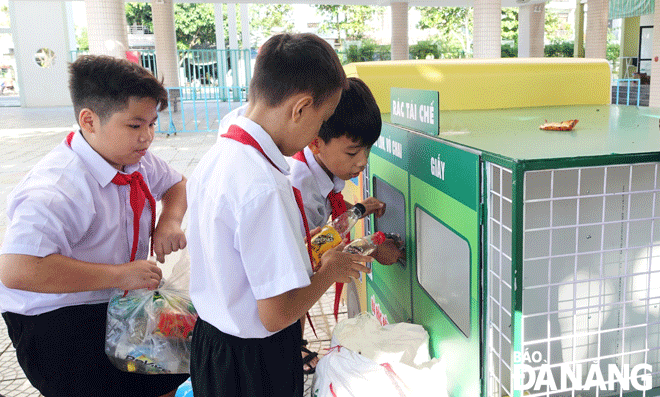Da Nang promotes public behaviour change for strengthening waste segregation at source
Authorities at local levels and relevant agencies in Da Nang are focusing on developing behaviour change campaigns in order to encourage local residents to promote source domestic waste classification in a bid to make sure their household waste is classified correctly to avoid penalties for breaches of the National Law on Environmental Protection which will take effect from January 1, 2025.
 |
| Collecting recyclable materials and turning trash into valuable products at the Tieu La Primary School located in Son Tra District. Photo: M.Q |
In 2023, the Son Tra District Office of Natural Resources and Environment worked with social- political organizations, authorities in 7 wards, and International Development Enterprises (IDE) to launch public education campaigns to promote the importance of garbage source classification performance in efforts to reduce plastic waste in residential areas, thereby contributing to encouraging the public to reduce their plastic waste and collect their recyclables.
Son Tra is one of the city’s best districts that have conducted effectively public education campaigns. Heed has been paid to organizing environmental festivals, displaying recycled and reused products, as well as collecting recyclable materials in an attempt to promote household-waste classification, and reduce plastic waste.
The Son Tra District Office of Natural Resources and Environment, has coordinated with the District’s Office of Education and Training, to organize environmental festivals themed ‘If waste is sorted correctly, it can be used as raw materials for new products’ at 6 primary schools in order to educate primary school pupils about environmental protection, encourage source sorting of household waste, and reduce plastic waste.
During these events, primary school pupils participated in presentation contests. These events aimed to raise their environmental awareness, as well as encourage them to play their part to protect the environment, and exchange recyclables found at home for their learning tools.
According to Mrs. Le Thi Thuy Nga, the principal of the Tieu La Primary School in Son Tra District, emphasized that focus is on spreading a message of ‘If waste is sorted correctly, it can be used as raw materials for new products’ in the school in an attempt to engage its pupils and their parents in promoting household-waste classification, collecting their recyclables, and converting them into useful products to save money and reduce waste sent to landfill.
Mr. Huynh Tan Bon, the Deputy Head of the Hoa Vang District Office of Natural Resources and Environment shared that over 50% of the district’s total households have been active in promoting household-waste classification. Domestic waste has been sorted into three categories: namely recyclables (plastic, paper, metal), food waste used for animal feed or fertilizer, and other residual waste. Recyclables are collected by recycling collectors and sent to materials recovery facilities.
Local residents often collect recyclables from their homes to sell to a buy-back centre or recycling branch for cash or give to sanitation workers and donate to villages’ women's organizations for charitable activities.
Meanwhile, food waste from households is utilized for animal feed. The remaining waste is collected, transported, and processed at the Khanh Son landfill by the Da Nang Urban Environment Company.
Hazardous waste is handled by specialized environmental service providers in line with the city’s regulations. Recyclables accounts for 15-20% of the total daily domestic waste generated in Hoa Vang District with an estimated 4.25 tons of garbage per day.
However, the district still faces challenges such as a lack of resources, bins, and designated areas for source-classified waste. A portion of the population has yet to adopt these practices. Therefore, the district is asking for help from the municipal Department of Natural Resources and Environment, and the municipal Environmental Protection Sub-Department to promote waste segregation at source in the locality in the coming time.
Meanwhile, Hai Chau District has paid special attention to raising awareness of garbage classification at source through public outreach campaigns in a bid to encourage people living in each residential area, and stallholders at traditional markets, along with members of each family to play their part to protect the environment.
The district and its wards have organized 37 environmental festivals, and environmental competitions which have attracted thousands of participants. Some areas are experimenting with the separation of food waste and leftovers. As a result, all 645 residential groups have attended awareness-raising sessions, 639 out of 645 residential groups in the district or 99% have collected their recyclables from their homes, while 99.92% of the district’s households, 98.3% of the district’s businesses, 100% of schools, and medical facilities in the district have performed garbage source classification.
Mrs. Nguyen Thi Kim Ha, the Deputy Head of the municipal Environmental Protection Sub-Department emphasized that with just one year remaining until the city will fully enforce the 2020 Environmental Protection Law. Accordingly, the city's waste management strategy focuses on sorting valuable recyclables from household waste into three categories: namely paper, plastic, and metal.
Successful adoption of this classification method by residents, businesses, and organisations across the city can lead to a significant reduction of 15-20% in the volume of waste requiring transportation for processing. The city is actively encouraging residents and businesses to sort their waste into three categories: organic waste, food waste, and leftovers on a trial basis.
Reporting by MAI QUE - Translating by DUY BINH